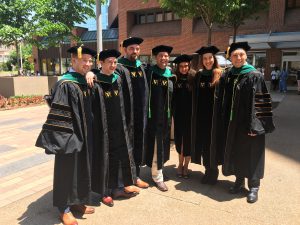Words of Wisdom from the Vanderbilt MSTP 2018 Graduating Class

We asked our recent graduates to pass along words of wisdom to the our MSTP students still in training. Here is what they had to say.
“It’s a marathon, not a sprint. Mentor over project. Fail, Fail, Fail – it’s the only way to learn. Repetition is the branding iron of knowledge. Be honest with everyone, but most importantly yourself. Mean people suck – be nice. Your first project in grad school never works – always have 2-3 backup projects. Find ways to be efficient. Follow the 2 minute rule – if it takes less than 2 minutes to do, just do it now. Most importantly – have fun, dammit! These are a great 7-8 years; you’ll make the best friends and colleagues of your life!” – Blair Stocks, Baylor (Urology)
“Our time as MD/PhD students is a good time to learn how much we can handle on our plate at one time, this includes family, friends, pets, hobbies, etc. You will be much efficient and effective in all of your commitments if you include your personal life on your to do list. Learn how to differentiate hard deadlines from soft deadlines. Complete the tasks that absolutely have to get done today, make time for what is important in your life, and know it is alright to go to bed when you are tired. The work will always be there when you wake up in the morning. It took me a long time to realize that my greatest challenge as a scientist was ignoring that every day there is one more paper that I need to read, one more experiment I need to start, and one more abstract I need to edit. Do any of those have to happen today? Probably not.” – Kevin Bersell, Brigham and Women’s Hospital (Internal Medicine)
“The importance of the mentor relationship cannot be understated. Your PhD mentor is somebody you will work closely with over the next 6 years and beyond. It has to be somebody that you trust and somebody that trusts you. Everybody has a good mentor when things are going well. A great mentor is somebody who will be there for you at the low points in science or in life, but will also support you and cheer for you at the high points as well. A great mentor will see your strengths and add to them, sometimes without you even realizing it.” – Brian Palmisano, Stanford (Internal Medicine)
“Remind yourself of why you took this path. Most of us come in wanting, ultimately, to improve the lives of patients through clinical and scientific endeavors; this is easy to forget among the details of tests and experiments. Remind yourself of this frequently, and use it to guide your scientific and career decisions.” – India Reddy, Vanderbilt (Psychiatry)
“Don’t be afraid to go out on a limb. Try new things, even if there is no guarantee it will pay off. If you have a strong feeling that your research or your career should be going a certain way, go for it. Some of the best discoveries, in and out of the lab, happen when you’re exploring down that metaphorical rabbit hole.” – Jacob P. VanHouten, Yale (Internal Medicine/Preventive Medicine)
“Over the course of 7+ years, you will have many good days and many bad days. Sometimes experiments will work, and sometimes they won’t. Sometimes you will know all the answers, and sometimes you won’t know any. The most important thing is to not fear the bad days and the failures. Don’t avoid challenging yourself because you are afraid you might fail. To quote Winston Churchill, ‘Success is not final, failure is not fatal: it is the courage to continue that counts.’ So no matter if yesterday was a good day or a bad day, try to approach each new day with the same determination and always keep pursuing success.” – Matthew De Niear, Vanderbilt (Surgery)
